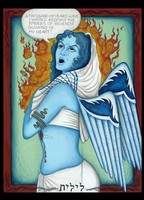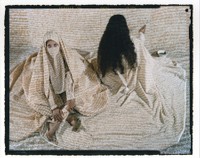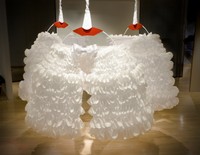CAMDEN – From installations made out of hair combs and paper doilies that investigate cultural stereotypes and heritage to paintings and textiles that reveal women as super heroes, a new exhibit at the Rutgers–Camden Center for the Arts explores women and identity in contemporary art.

Now open to the public, “A Complex Weave: Women and Identity in Contemporary Art” will extend through Dec. 18 in the Stedman Gallery on the Rutgers–Camden Campus, which is the inaugural site for the exhibit’s national tour. This represents the first time that a prominent national art tour will originate from Rutgers–Camden.
According to exhibit co-curator Martin Rosenberg, a professor of art history and chair of the fine arts department at Rutgers–Camden, “A Complex Weave” aims to provide a sampling of how women artists who differ in age, ethnicity, religion, sexual orientation, and other aspects of individuality have woven threads of identity into their work.
“’A Complex Weave’ neither attempts to be an international survey, nor is it narrowly focused on a single aspect of identity. Rather, by bringing together work by 16 diverse women artists, this exhibition hopes to throw some additional light on the complex weave of gender and identity in contemporary art,” notes Rosenberg, co-author of the book Gender Matters in Art Education (Davis Publications, 2007). The various issues the exhibit raises are further addressed in an accompanying full-color 90-page catalog, authored by Rosenberg and co-curator J. Susan Isaacs of Towson University.

The Stedman Gallery is open Monday through Saturday 10 a.m. to 4 p.m., and until 8 p.m. on Thursdays. On select Sundays, Oct. 18; Nov. 1; Nov. 15; and Dec. 6, the gallery also will be open. “A Complex Weave” will travel next to Towson University in Maryland, where exhibit co-curator J. Susan Isaacs is a professor of art history. After 2010, the national touring schedule will be managed by Curatorial Assistance.
Two symposia, which will take place in the Gordon Theater, and six gallery talks have been organized to coincide with “A Complex Weave.”
The interdisciplinary symposium “A Complex Weave: Diverse Perspectives” at 1:30 p.m. Thursday, Sept. 24, will feature Rutgers–Camden scholars Cynthia Saltzman, an adjunct professor of sociology; Charlotte Markey, an associate professor of psychology; Lynne Valone, a professor and chair of childhood studies; and Shin-yi Chao, an assistant professor of philosophy and religion.

The symposium “A Complex Weave: Women and Identity in Contemporary Art” at 1 p.m. Friday, Oct. 9, will feature feminist art critic Eleanor Heartney as the keynote speaker, and presentations by exhibition artists Siona Benjamin, Flo Oy Wong, Philemona Williamson, and Blanka Amezkua. A reception with the artists will follow the discussion.
Gallery talks will take place at 12:15 p.m. on Thursdays, beginning with exhibit co-curator Martin Rosenberg on Oct. 15; artist Zoë Charlton on Oct. 22; artist Julie Harris on Oct. 29; artist Judy Gelles on Nov. 5; exhibit co-curator J. Susan Isaacs on Nov. 12; and Rutgers–Camden professor emerita of art history Roberta Tarbell on Nov. 19.
The Stedman Gallery and the Gordon Theater are both located in the Fine Arts Complex on Third Street, between Cooper Street and the Benjamin Franklin Bridge on the Rutgers–Camden Campus.
Featured artists include: Siona Benjamin, an Indo-Jewish artist now residing in New Jersey, whose work combines elements of Indian and Euro-American art; Sharon Harper, a Missouri artist whose work addresses such themes as sexual orientation, body image, religion, and identity; Julie Harris, an Ohio artist now residing in New Jersey, who uses handmade paper and various printmaking techniques to deal with issues of identity and biography; Zoë Charlton, an African-American painter and video artist teaching at American University, who plays with stereotypes; California artist Flo Oy Wong, a Chinese-American artist, whose work deals with family and cultural heritage; Lalla Essaydi, a Moroccan photographer, whose work deals with women’s place in Muslim society; Fujiko Isomura, a young Japanese-American artist who uses digital manipulations of traditional Japanese images to make statements about women’s place in society; Tatiana Parcero, a Mexican photographer, now living in Argentina, who combines images of herself with colonial maps and other overlays; Sarah Amos, an Australian artist, whose work draws on a wide range of sources including indigenous Australian art; Helène Aylon, a Jewish feminist artist who interrogates the text and patriarchy of the Hebrew Bible; Philemona Williamson, an African-American artist, who creates fanciful narratives about childhood and adolescence; Annet Couwenberg, a fabric, textile, and installation artist who creates forms which reference clothing and structure; April Wood, a sculptor who works with decorative objects which reference the body; Judy Gelles, a photographer whose work centers around identity and women’s place in the family; Blanka Amezkua, a Mexican-American artist whose imagery draws on stereotypes of women drawn from Mexican comics; and Sonya Clark, an African-American artist who uses combs in emulation of human hair to explore aspects of ethnicity.
This exhibition is part of the Feminist Art Project, centered at Rutgers, a nationwide, multi-year series of exhibitions and other activities promoting feminist art. The exhibition, and accompanyting catalog, has been organized and produced by the Rutgers-Camden Department of Fine Arts and the Rutgers-Camden Center for the Arts, and is made possible in part with support from the Institute for Women and Art, the office of the Vice President of Resarch, Graduate and Professional Education, and the office of the Associate Vice President for Partnerships in the Arts and Humanities at Rutgers, The State University of New Jersey; the New Jersey State Council for the Arts/Department of State, a Partner Agency of the National Endowment for the Arts, The Dodge Foundation, Towson University, and other funders.
For more information on the Rutgers–Camden Center for the Arts, call (856) 225-6245. For more information on the Rutgers–Camden Department of Fine Arts, visit finearts.camden.rutgers.edu.-30-
Media Contact: Cathy K. Donovan
(856) 225-6627
E-mail: catkarm@camden.rutgers.edu